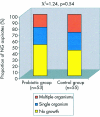A prospective randomised study of the probiotic Lactobacillus plantarum 299V on indices of gut barrier function in elective surgical patients
- PMID: 12427785
- PMCID: PMC1773461
- DOI: 10.1136/gut.51.6.827
A prospective randomised study of the probiotic Lactobacillus plantarum 299V on indices of gut barrier function in elective surgical patients
Abstract
Background: Bacterial translocation occurs in surgical patients and may predispose to postoperative septic morbidity. Many factors are thought to influence the prevalence of bacterial translocation, one of which is the composition of the gut microflora. The aim of this prospective and randomised study was to assess the effect of the probiotic Lactobacillus plantarum 299v on the incidence of bacterial translocation, gastric colonisation, and septic complications in elective surgical patients.
Methods: Patients undergoing elective major abdominal surgery were randomised to either a treatment or control group. The treatment group received an oral preparation containing Lactobacillus plantarum 299v (Proviva) for at least one week preoperatively and also in the postoperative period. Bacterial translocation was determined by culture of a mesenteric lymph node and serosal scraping obtained at laparotomy. Gastric colonisation was assessed by microbiological culture of nasogastric aspirates. All postoperative septic complications were recorded.
Results: A total of 129 patients completed the study (probiotic group n=64). There was no significant difference between the two groups in terms of bacterial translocation (12% v 12%; p=0.82), gastric colonisation with enteric organisms (11% v 17%; p=0.42), or septic morbidity (13% v 15%; p=0.74).
Conclusions: Administration of Lactobacillus plantarum 299v in elective surgical patients does not influence the rate of bacterial translocation, gastric colonisation, or incidence of postoperative septic morbidity.
Figures
Similar articles
-
Randomised clinical trial of synbiotic therapy in elective surgical patients.Gut. 2004 Feb;53(2):241-5. doi: 10.1136/gut.2003.024620. Gut. 2004. PMID: 14724157 Free PMC article. Clinical Trial.
-
An investigation into the effect of a probiotic on gut immune function in surgical patients.Clin Nutr. 2004 Oct;23(5):1069-73. doi: 10.1016/j.clnu.2004.01.010. Clin Nutr. 2004. PMID: 15380897 Clinical Trial.
-
A prospective randomised trial of probiotics in critically ill patients.Clin Nutr. 2005 Apr;24(2):211-9. doi: 10.1016/j.clnu.2004.08.008. Clin Nutr. 2005. PMID: 15784480 Clinical Trial.
-
Probiotics in foods not containing milk or milk constituents, with special reference to Lactobacillus plantarum 299v.Am J Clin Nutr. 2001 Feb;73(2 Suppl):380S-385S. doi: 10.1093/ajcn/73.2.380s. Am J Clin Nutr. 2001. PMID: 11157345 Review.
-
Use of probiotics as prophylaxis for postoperative infections.Nutrients. 2011 May;3(5):604-12. doi: 10.3390/nu3050604. Epub 2011 May 12. Nutrients. 2011. PMID: 22254113 Free PMC article. Review.
Cited by
-
Randomised clinical trial of synbiotic therapy in elective surgical patients.Gut. 2004 Feb;53(2):241-5. doi: 10.1136/gut.2003.024620. Gut. 2004. PMID: 14724157 Free PMC article. Clinical Trial.
-
The role of gut microbiota in cancer treatment: friend or foe?Gut. 2020 Oct;69(10):1867-1876. doi: 10.1136/gutjnl-2020-321153. Epub 2020 Aug 5. Gut. 2020. PMID: 32759302 Free PMC article. Review.
-
Synbiotics and gastrointestinal function-related quality of life after elective colorectal cancer resection.Ann Gastroenterol. 2016 Jan-Mar;29(1):56-62. Ann Gastroenterol. 2016. PMID: 26752951 Free PMC article.
-
Impact of Probiotic Administration on Serum C-Reactive Protein Concentrations: Systematic Review and Meta-Analysis of Randomized Control Trials.Nutrients. 2017 Jan 3;9(1):20. doi: 10.3390/nu9010020. Nutrients. 2017. PMID: 28054937 Free PMC article.
-
Probiotic intervention has strain-specific anti-inflammatory effects in healthy adults.World J Gastroenterol. 2008 Apr 7;14(13):2029-36. doi: 10.3748/wjg.14.2029. World J Gastroenterol. 2008. PMID: 18395902 Free PMC article. Clinical Trial.
References
-
- Saadia R, Schein M, MacFarlane C, et al. Gut barrier function and the surgeon. Br J Surg 1990;77:487–92. - PubMed
-
- Deitch EA. Nutrition and the gut mucosal barrier. Curr Opin Gen Surg 1993:85–91. - PubMed
-
- Fuller R. Probiotics in man and animals. J Appl Bacteriol 1989;66:365–78. - PubMed
-
- Saxelin M. Lactobacillus GG—A human probiotic strain with thorough clinical documentation. Food Rev Int 1997;13:293–313
Publication types
MeSH terms
Substances
LinkOut - more resources
Full Text Sources


